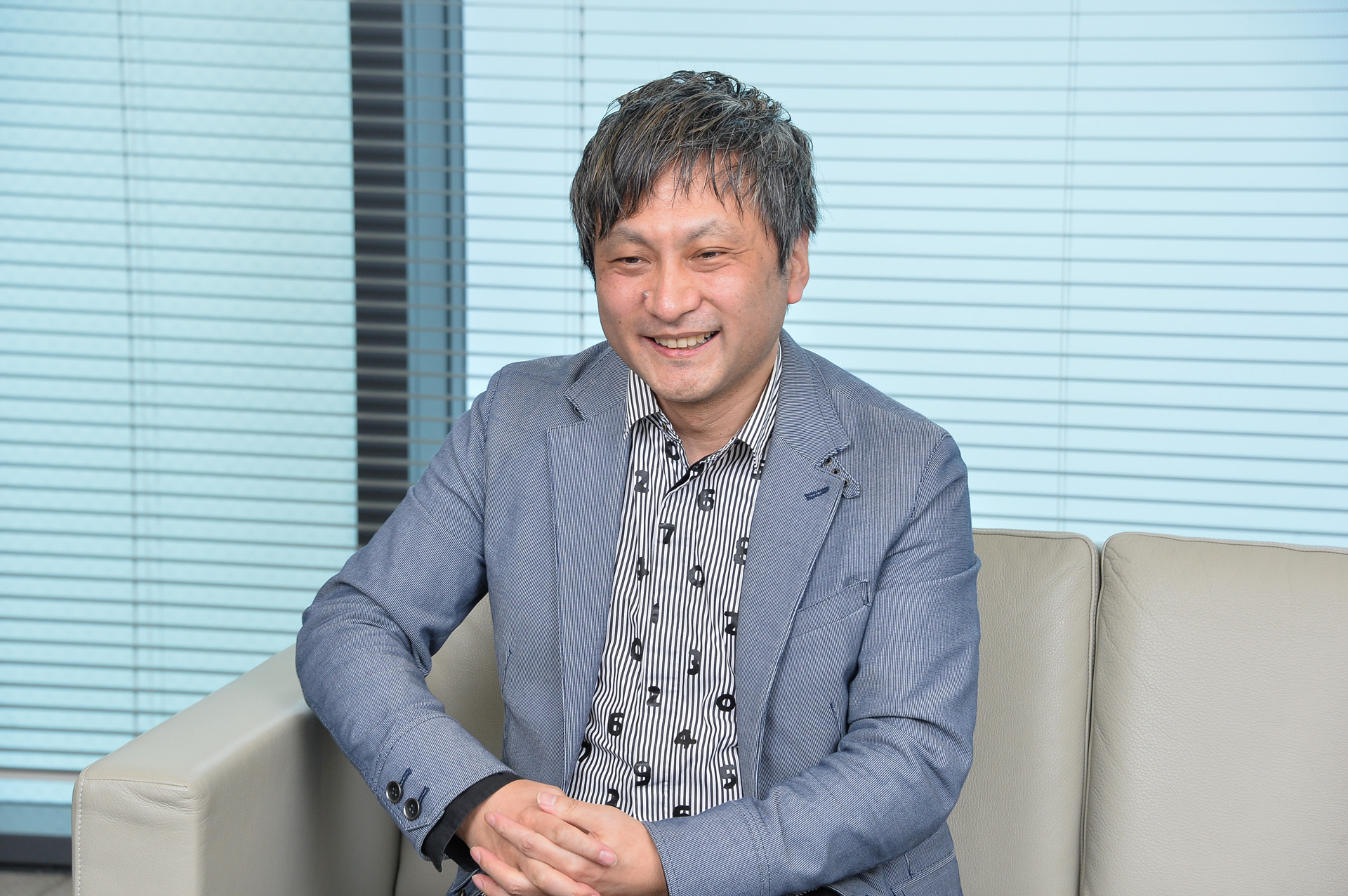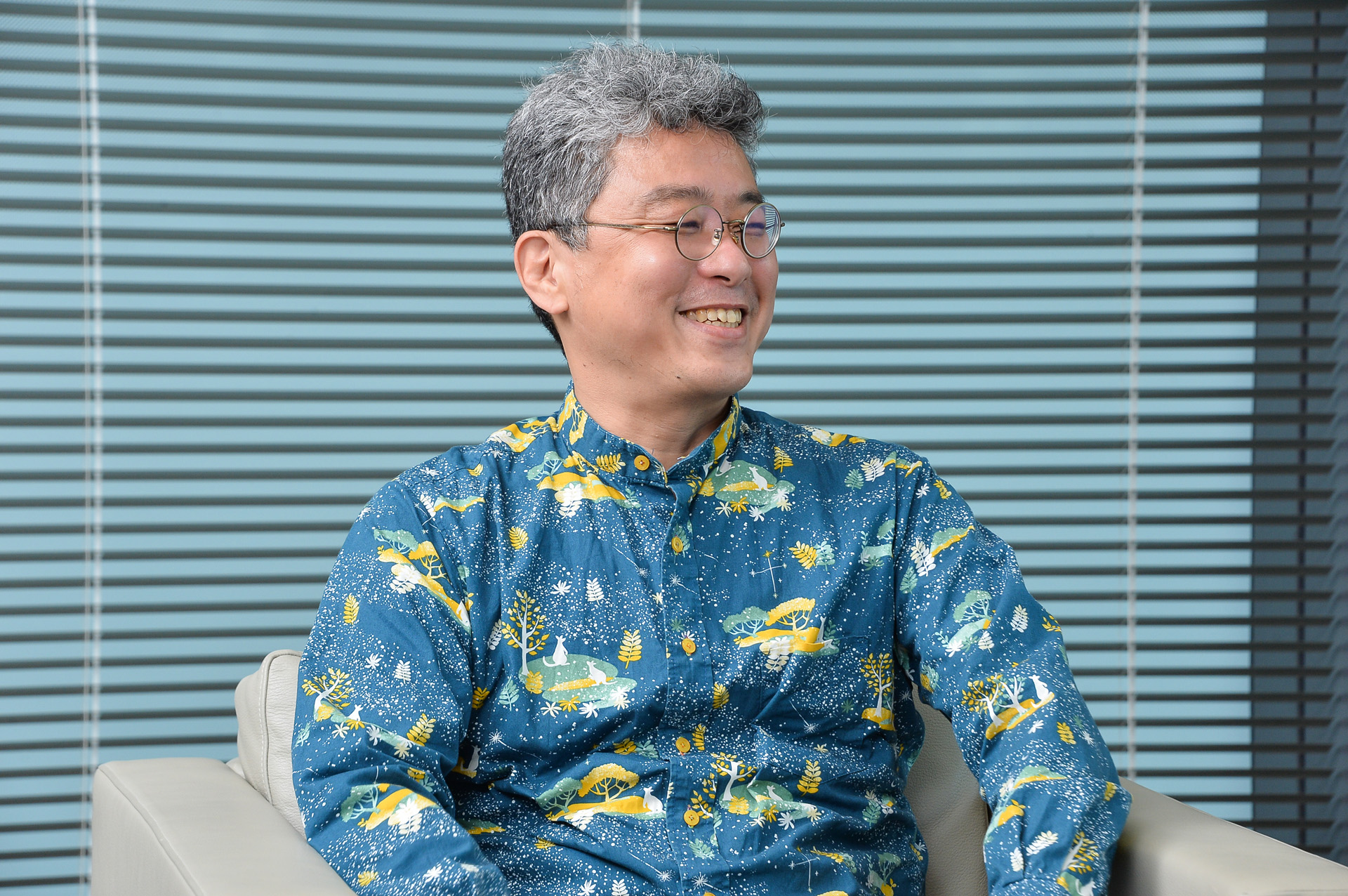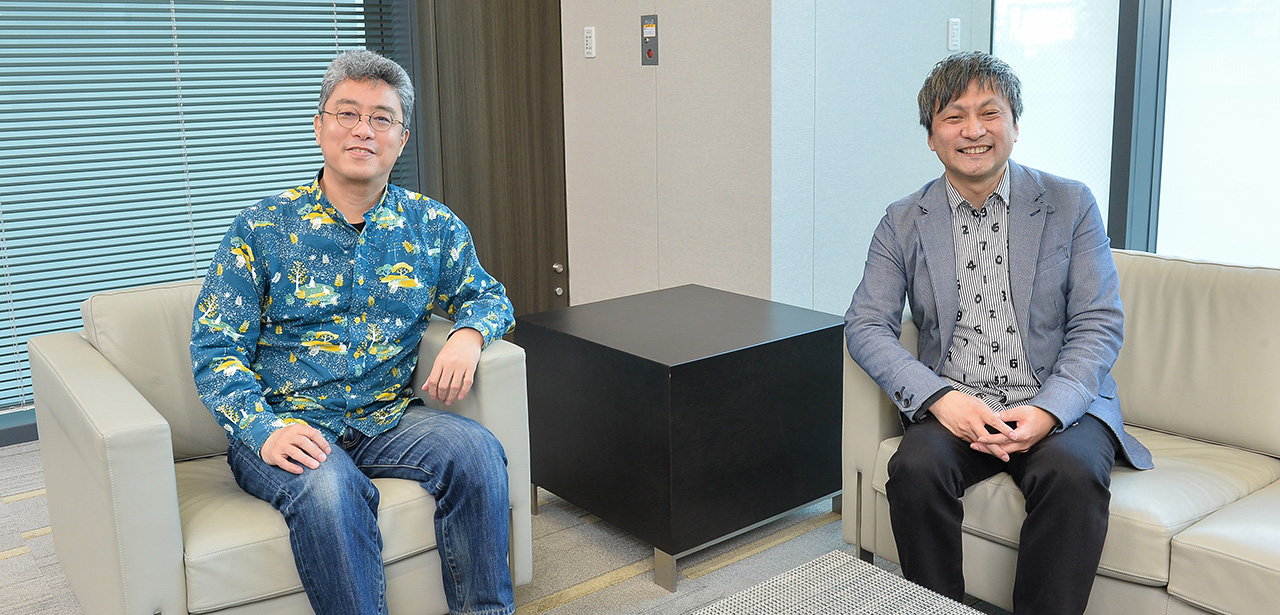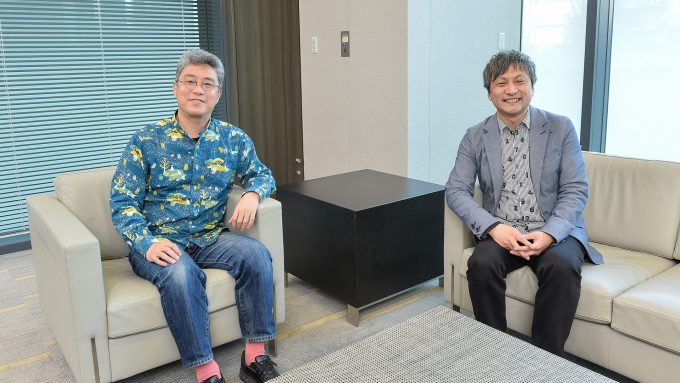“WE DISCUSS VANA’DIEL” is a series of conversations between Producer Matsui and special guests who are familiar with FINAL FANTASY XI (FFXI). Our thirteenth guest is Koji Aoyama, the original Director of PlayOnline (POL) and current Producer of the MMORPG DRAGON QUEST X Online (DQX Online). In this second part, Mr. Aoyama shared his stories of joining Square (now Square Enix) as well as a surprising fact about his first encounter with Mr. Matsui.

Producer of DRAGON QUEST X Online. Following his departure from Hudson, he joined Square (now Square Enix) in 1999 and assumed the role of Director for PlayOnline. Mr. Aoyama then joined the DRAGON QUEST X Online development team as Technical Director and later succeeded Yosuke Saito as Producer in 2018.
Learning the truth 20 years later
Mr. Aoyama, what made you move to Square (now Square Enix) in 1999?
- Aoyama
FFVII had me awed, which was one reason. For example, FFVII reads movie data from the CD-ROM and plays it back, which was an amazing feat that took advantage of CD-ROMs’ large data capacity. I got the impression that Square was capable of making the most of cutting-edge technology in their work. I’d always wanted to make the best game in the world too, so I conveyed that desire to Square in my application.
- Matsui
Did you have an easy time getting into Square?
- Aoyama
I haven’t talked about this very often, but my application was actually rejected once. My initial application included all my technical skills and patents, which I submitted with a lot of confidence. However, I received a rejection letter from Square’s game development division.
But about a month after that, I received a job offer from their patent office, where they conducted meetings with programmers and confirmed what technology was patentable, similar to what legal affairs and intellectual property management divisions do today. I was 30 years old, which was considered the retirement age for programmers at the time; on top of that, I also owned several patents myself, so I thought, “Maybe it’s time for me to move on to patenting,” and accepted the offer. - Matsui
Oh my! (laughs)
- Aoyama
I had a lighthearted mindset going into the job, but working with patents turned out to be grueling work and far more specialized than I’d expected. I still stuck with it for about a year, but eventually reached my limit and approached my supervisor about quitting. However, since my work had me frequently keep in touch with the programming staff in our company, the leader of the technology development division invited me to join them instead.
* The Square Millennium Event was an announcement event held at Pacifico Yokohama in 2000, where FFIX, FFX, and FFXI were announced simultaneously.
That’s how I ended up in a team for researching and developing cutting-edge technology, but I guess it was because I was recognized for my business acumen, not for my technical skills. At the Square Millennium Event*, Mr. Sakaguchi* had mentioned a future need for “programmers who also understand business,” and when I asked our division lead what he meant by that, they replied, “He was talking about you.” (laughs) Now that I mention it, I must’ve been noticed for my ability to communicate well, rather than for my programming abilities.
* Hironobu Sakaguchi, one of the founders of the FF series.

In various interviews, you’ve mentioned that Square excels at production with large teams. What were your impressions when you first joined the company?
- Aoyama
I wasn’t paying attention to Square as closely before I joined, but when I was hired on, I was surprised by how their producers were considered an executive role. Square’s producers carried a completely different authority compared to those at my previous job, with people like Mr. Hiromichi* commanding an enormous amount of power. The company structure promoted the betterment of games, and I thought its leaders like Mr. Hiromichi and Mr. Matsuno* had a careful eye on the entire organization and were managing it very well. Joining Square reinforced my appreciation for the massive corporations and administrative know-how required when creating large-scale games like FFVII.
* Hiromichi Tanaka, original Producer for FFXI.
* Yasumi Matsuno, Director of FINAL FANTASY Tactics, Vagrant Story, and other works; former Development Producer for POL. - Matsui
Although we were capable of producing major titles, I personally didn’t think our company’s administration was very good. Perhaps it’s because I have no other organization to compare it to, since Square was the first company I joined. Let’s say we carried out a project requiring 30 to 40 staff members; if our next project were to require about 200 members, we would’ve been like, “Oh, that just means we need five times as many people as last time.” In reality, however, going from 40 to 200 members doesn’t simply equate to five times as much output; there’s the question of how effectively we can prevent details from getting lost when conveying information within the team. Back in the day, if Mr. Sakaguchi announced that a game’s specifications were changed, everyone groaned but still managed to pull through. If something like that were to happen nowadays in a project with 200 people, it would be a disaster. (laughs)

- Aoyama
But I don’t think corporations typically get anywhere when they have teams that large. It’s quite amazing how Square was able to function properly even with the size of their teams.
By the way, when did you two first meet?
- Aoyama
It actually wasn’t when I joined Square, but much earlier, in April 1986. Do you remember, Mr. Matsui?
- Matsui
Actually, Mr. Kasuga* mentioned that you and I went to the same university. When I asked him, “What year?” he answered “1986,” which is how I found out we were in the same year. (laughs)
* Hideyuki Kasuga, former Network Programmer for FFXI and former Lead Programmer for FFXIV. So you both attended Tokyo Institute of Technology in the same year.
- Aoyama
That’s right. We were even in the same department and class of 170 students, but weren’t directly acquainted. I’m sure we all introduced ourselves early on in the year, but we both didn’t realize we’d met before until about 20 years later. Incidentally, I also don’t really remember where we met after I joined the company…
- Matsui
I was part of the planning staff but ended up doing my own programming, so I was on our company’s programmer mailing list. That’s where I saw your name, and we all assembled for the programmers’ regular meeting, so I’d assume I ran into you there as well.
- Aoyama
We didn’t have an opportunity to personally work together until a while after that.
- Matsui
When we had an overnight seminar at the office, during the evening party, I remember discussing with Mr. Aoyama about what programming language would be most suitable for our kids to start with. I suggested assembly code, since we’d started from that, and it allowed us to know how code is processed in the end. But Mr. Aoyama felt that it didn’t matter what programming language our kids learned from, since programmers nowadays know their way around GPUs with no knowledge of assembly code.
- Aoyama
Yes, that sounds like something I would’ve said.
- Matsui
I don’t know if it was thanks to that conversation, but my eldest son is a programmer now. (laughs)
- Aoyama
My son didn’t follow that path. I gave him a PC when he was in third grade and personally taught him programming since fourth grade, but perhaps that contributed to why he loathes it nowadays. (laughs wryly) Admittedly, I might’ve started teaching him too early. He still comes to me with questions about his programming course in high school. That said, he still insists that he hates it…
Incidentally, what were your impressions of each other around the time you had that discussion?
- Matsui
The mailing list, which I mentioned earlier, included the primary leader-class programmers, including those for POL, and each had their own way of doing things. I had the impression that Mr. Aoyama was able to bring them all together in a very organized fashion. He managed to unify people with such unique, or rather, strong senses of individuality and carry out the project, which was impressive.
- Aoyama
Well, it was actually Mr. Narita* who had everything under control.
* Ken Narita, former Programming Director for FFXI and Producer for PlayOnline Viewer. - Matsui
There definitely was a sense of security in knowing that Mr. Narita was there for us in a pinch. That said, I remember you were the one usually coordinating everything.
- Aoyama
I’m flattered to hear that’s how I was perceived. To be honest, things were really tough for me back then. (laughs) Some of Square’s best programmers from past hits were assigned to FFXI, but they’d bicker among themselves about whose method was right.
- Matsui
Not to mention how they didn’t mince their words in a lot of those exchanges. (laughs) I always felt very timid being in the same mailing list and attending meetings with that crowd.
- Aoyama
From my end, you and other planning members seemed like pros who could do anything, even programming. You seemed particularly exceptional, and I reckoned someone with your amazing capabilities would typically be considered a programmer in other companies.
- Matsui
I can’t keep up with the hardware side of programming at all, so in that sense, I’d say I have a relatively limited knowledge of programming.
- Aoyama
So you say, but what’s crucial is that self-awareness of your own abilities. For example, if I were interviewing fresh graduates and asked, “How much do you know about programming?” and one of them answered, “Well, hardware is outside my expertise,” I’d consider them to be an excellent candidate. Programmers who have a grasp on the overall gist of how the hardware works will never run into a situation where they say, “I can’t explain this code, but the program works as intended!” So the fact that someone can confidently answer “I don’t know,” is evidence of their high proficiency.
* Part 3 will be available on October 19, 2022.




